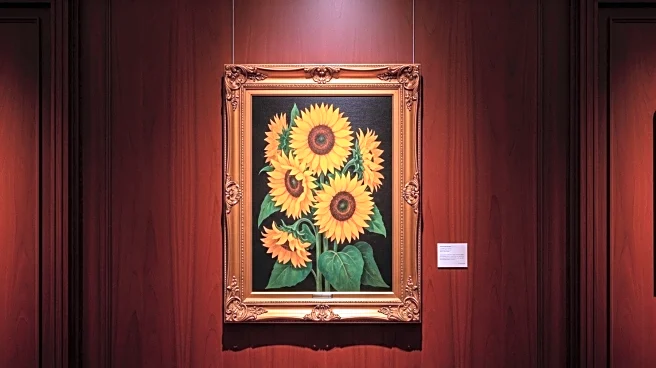What's Happening?
The heirs of Paul von Mendelssohn-Bartholdy, a Jewish banker and art collector, are continuing their legal battle in U.S. courts to reclaim Vincent van Gogh's painting Sunflowers, currently valued at $250 million. The painting is owned by Sompo Holdings, a Japanese insurance company, which acquired it in 1987 for $25 million at a London auction. The heirs argue that the painting was sold under duress by Mendelssohn-Bartholdy in 1934 due to pressure from the Nazi regime. Their case was initially dismissed by a lower court in June 2024, but they have since appealed to the U.S. Court of Appeals for the Seventh Circuit. The appeal was presented to a three-judge panel on September 17, 2025. The heirs are invoking the Holocaust Expropriated Art Recovery (Hear) Act of 2016, which aims to facilitate the recovery of art looted during the Nazi era.
Why It's Important?
This case highlights ongoing efforts to address historical injustices related to art looted during the Nazi era. The outcome could set a precedent for similar claims under the Hear Act, impacting how U.S. courts handle cases involving art restitution. The case also underscores the complexities of international art ownership and the legal challenges involved in reclaiming cultural heritage. If successful, the heirs could potentially recover significant financial value and contribute to broader restitution efforts. The case also raises questions about the responsibilities of current art holders to investigate and acknowledge provenance issues.
What's Next?
The panel of judges has yet to rule on the appeal, and the timeline for a decision remains uncertain. Depending on the outcome, the case could either proceed further in the U.S. legal system or potentially be resolved through settlement negotiations. The decision could influence future claims under the Hear Act and affect international relations regarding art restitution. Stakeholders, including museums and private collectors, may need to reassess their holdings and provenance research practices.
Beyond the Headlines
The case touches on ethical considerations regarding the ownership and display of art with contested histories. It also highlights the role of international agreements, such as the Terezin Declaration, in shaping restitution policies. The legal arguments presented may influence how non-binding agreements are interpreted in U.S. courts, potentially affecting foreign policy and diplomatic relations.









